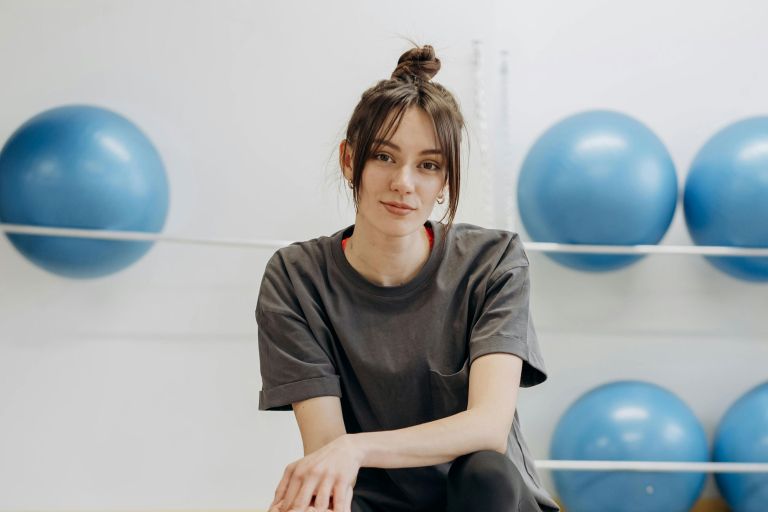About Anna
Anna turned her lifelong interest in health and wellbeing into a rewarding career as an Exercise Physiologist specialising in clinical exercise. She enjoys the variety of her job which includes meeting people from different backgrounds, using her creativity and organisation skills to help them recover and stay healthy.

“Finding ways for people who may face disease or injury-specific barriers to move and live healthier lives is incredibly rewarding.”
What was your pathway to Health and Social Assistance?
I have always been interested in health, wellbeing and physical activity. I enjoyed PDHPE (Physical Education) at school and maintain an active lifestyle. I was heavily involved in sports growing up, and still enjoy watching them, but I always was interested in general health and ageing well so you can live healthily whatever your life stage.
I studied a Bachelor of Human Movement (similar to Sports Science). With this degree, I could have pursued personal training or sports coaching roles, but I was more interested in helping people access safe and enjoyable physical activity if they had injuries or were unfamiliar with movement.
For this reason, I studied a Masters in Clinical Exercise Physiology (Rehabilitation). Now I could work with people of all ages, the elderly, those recovering from injuries or surgeries, or those wanting to be healthier.
University of Technology Sydney
Bachelor Human Movement
Similar to Sport Science, this degree enables many careers including personal training and sports coaching.
Charles Sturt University
Master of Clinical Exercise Physiology (Rehabilitation)
Anna becomes registered as an Exercise Physiologist with Exercise and Sports Science Australia (ESSA).
Various clients and organisations
Self-employed as an Exercise Physiologist
Anna starts working with a variety of clients.
Academic and training institutions
Academic and lecturing opportunities
Anna starts sharing her knowledge and experience with others in the industry.
My study took 5 years in total. My degree was 3 years, but I took 4 years as I was already working in health settings. The Masters took 1 year. It came with significant workplace learning – around 500 hours. This was very hard to manage with work, but I got to learn from hospitals, physiotherapy clinics and sports groups. I really enjoyed it.
What does your role involve?
As an Exercise Physiologist I create personalised exercise plans that help people recover from injuries, manage chronic illnesses, or simply get fitter. I assess each client to build safe and effective exercise routines. I also educate clients on how to maintain their health through exercise. It’s not just working out; it’s about helping individuals understand and apply the principles of physical health to improve their daily lives.
Variable work hours
Your work hours depend on where you work. With physical training clients, a day could start very early, with a break in the middle of the day, then be busy at night. With sports clubs there will be weekend work. If you work in a clinic, you can set your hours to the more standard 9am to 5pm.
Physical activity
Exercising, chatting and physical activity tend to lead to lots of collaboration and laughter. Being active makes the day go very quickly. While it's not physically taxing activity, there tends to be lots of moving around and talking as the client or patient moves.
Are there flexible work arrangements?
Certainly. The longer I have been in the industry, the more I learnt this. Part-time roles are regularly advertised. Now I ask employers to try and make a schedule that works for both of us.
What has helped you succeed?
Communication is a must. Listening too. Especially if you are working one-on-one with clients or patients, talking is a big part of every day.
Being comfortable working with diverse clients keeps the job interesting, and you learn so much from people's exercise beliefs and preferences.
On the one hand, creativity helps to write client programs, and on the other hand, having organisation skills helps to balance multiple clients.
I really enjoy professional development, courses about healthy ageing, sports and healthy eating. This helps keep my knowledge current.
How can you get into the industry?
With my Masters degree I am an accredited Exercise Physiologist with ESSA. This means I can practice as a registered provider and bill through Medicare, but there are other pathways to get into this type of healthcare.
There are TAFE courses in fitness and aged care, there are 3-year Exercise Physiology degrees (without Masters), and some people focus on sports or coaching through sports bodies, to work in a similar field. Because it is so broad, there are many ways to enter the field.
Seeking a mentor and volunteering with various organisations formally and informally helped me decide if the industry was a good fit for me.
What role does technology play?
Any computer skills come in handy. Things such as bookkeeping and booking management will require some basic IT skills.
Technology is also useful when providing treatment by helping:
- program exercise plans
- clients learn exercise techniques by recording videos and providing video feedback
- log activities with digital tracking devices, although some clients will prefer paper diaries.
Virtual health appointments are very useful, and I believe telehealth will continue to grow and improve the access people have to services. However, having a trainer or physiologist help with technique face to face will continue to be important. People also enjoy the social interaction associated with going to the gym.
What don't people know about your industry?
The amount of study required for certain roles. For instance, some people are unaware of the level of training and ongoing professional development required to be an accredited Exercise Physiologist. You require approximately 20 hours (or points) a year of relevant upskilling.
For me personally, it’s worth it. Finding ways for people who may face disease or injury specific barriers to move and live healthier lives is incredibly rewarding.
Do your research on the requirements to become registered in your health field, or if you can’t commit to 4 to 5 years of study, seek other pathways such as sports coaching.
What's next for you?
I continue to enjoy working in a diverse and exciting field with a range of clients and love the day-to-day job of helping people lead a healthy and active life. I also enjoy mentoring the next generation of professionals in my field.
Additional questions about Health Care and Social Assistance?
NSW Careers has a team of industry experts who can talk to you one-on-one about what it’s like to work in this industry.

Talk to one of our specialists
Access free one-on-one personalised support with a career specialist. At any career stage you can talk with a specialist from Careers NSW about your goals and how you can achieve them.

